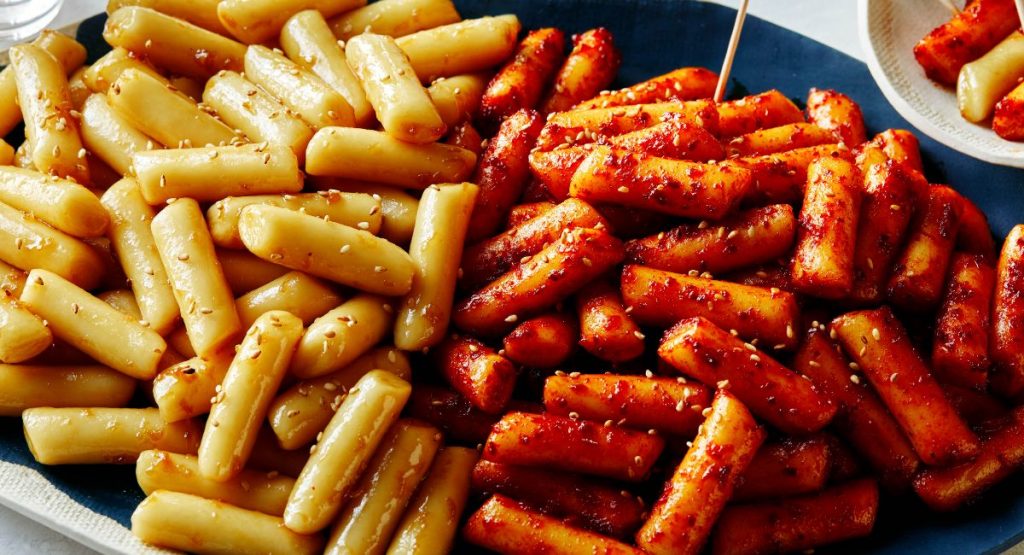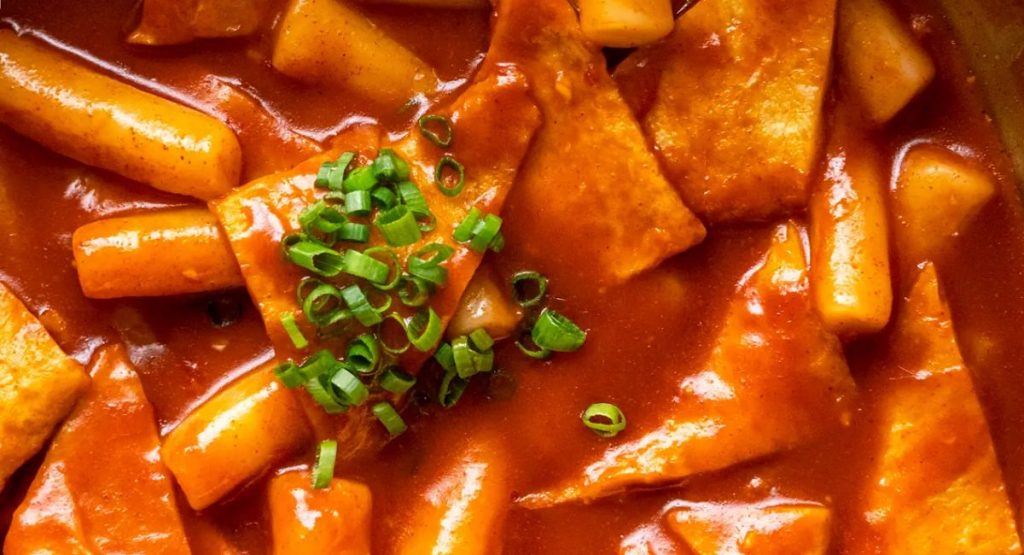Are you a fan of Tteokbokki, the popular Korean dish? If so, you may be wondering if it is halal or not. Many people are unfamiliar with the ingredients used in this delectable snack and often don’t know if they follow Muslim dietary laws or not. This article will answer the question “Is Tteokbokki Halal?” and provide you with all the information you need to make an informed decision. We will take a look at the ingredients used in tteokbokki, as well as other considerations that may influence halal status such as cooking utensils and preparation. Armed with this knowledge, you can make the best decision for yourself and your family. Let’s get started!
Tteokbokki
Tteokbokki is a popular Korean snack dish made from soft rice cakes, fish cakes, and other ingredients in a spicy Gochujang sauce. It originated during the Joseon Dynasty (1392–1897) as a royal court dish and has since become an iconic comfort food in Korea. Tteokbokki is often served in the form of a snack, but it can also be found on restaurant menus. The dish varies from region to region and can contain different ingredients.
One popular version of tteokbokki is gungjung tteokbokki, which originated as an aristocratic dish during the Joseon Dynasty. It is made with slices of beef, mushrooms, and scallions cooked in a soy sauce and sugar-based broth or glaze. The ingredients are simmered together until they become soft and are then served over steamed rice or noodles.
Modern tteokbokki recipes can vary widely depending on the region where it is being prepared. In some areas, like Seoul, tteokbokki can include ingredients such as boiled eggs, ramen noodles, cheese, and vegetables. Other regional variations may replace Gochujang with doenjang (Korean soybean paste) or incorporate kimchi into the recipe.
The most common way to enjoy tteokbokki is street food. It can be found in many marketplaces and street vendors throughout Korea, often served hot on skewers or from a large pot over an open flame. Restaurants may also serve the dish, but usually, they will feature their own variations with different ingredients and sauces.
Tteokbokki is an incredibly versatile dish that can be enjoyed in many different forms. No matter how it’s prepared, this beloved snack will always remain a staple of Korean cuisine. Whether you try the traditional gungjung tteokbokki or one of the modern variations, it’s sure to become one of your favourite dishes.
Whether you’re a fan of the spicy flavours of Gochujang or doenjang, you’ll find something to love with tteokbokki. Whether it’s served as street food or prepared at home, be sure to add this Korean classic to your list of must-try dishes!
Ingredients Of Tteokbokki

Tteokbokki is a popular Korean street food. It consists of soft rice cakes, vegetables, and fish cakes boiled in a spicy gochujang-based sauce. The dish can be enjoyed with various toppings such as cheese, eggs, or even ramen noodles! Here are some of the key ingredients that make this delicious Korean food:
- Gochujang: Gochujang is a staple ingredient in most Korean dishes and is the main seasoning for tteokbokki. This red chili paste adds a spicy flavor to the dish, as well as a bit of sweetness from its sugar content.
- Rice cakes: The most important ingredient in tteokbokki is the rice cake. These soft, chewy cakes are made from steamed and pounded glutinous rice flour, providing a unique texture to the dish.
- Fish cakes: Fish cakes are usually sliced into thin strips and added to the tteokbokki sauce for extra flavor.
- Vegetables: Tteokbokki is usually made with a variety of vegetables, including cabbage, onion, carrot, and Korean radish (mu) for crunch and sweetness.
- Seasonings: Garlic, ginger, sesame oil, and soy sauce are commonly used to season the tteokbokki sauce.
These are the essential ingredients for tteokbokki. With this combination, you can create a delicious and comforting Korean dish that everyone will love!
Is Tteokbokki Halal?

Tteokbokki is a popular Korean snack food made of soft rice cakes in a spicy sauce. It varies greatly in ingredients, with some recipes including seafood, pork, beef or chicken. This has led to much confusion regarding whether the dish is considered halal or not.
In general, most Tteokbokki recipes do not contain any ingredients that would be considered haram (forbidden) in Islam. However, as some chefs may add un-halal ingredients to the dish, it is important for Muslims to inquire about a recipe before consuming Tteokbokki.
In most halal eateries, you will find Tteokbokki made with only halal ingredients, such as vegetables and spices. This makes it safe for Muslims to enjoy the dish without having to worry about any religious restrictions.
When in doubt, it is best practice to ask the chef or restaurant staff what ingredients are used in their recipe of Tteokbokki. This way, Muslims can be sure to only consume halal Tteokbokki which is free of haram ingredients. Ultimately, the decision on whether or not to eat Tteokbokki is a personal one for each Muslim to make based on their level of comfort and understanding of the ingredients used in the dish. As long as the ingredients used are known and halal, then there is no reason why any Muslim would not be able to enjoy this delicious Korean snack!
Conclusion
In conclusion, while there is no definitive answer to whether or not Tteokbokki is halal, it is important for those who follow a halal diet to carefully consider the ingredients that might be used in its preparation. Some of the common ingredients such as fish sauce and chilli paste may contain substances that are not suitable for consumption by those who follow halal dietary guidelines. Additionally, some restaurants may use pork or lard in their recipes, which would make it non-halal. Ultimately it is up to the individual to decide if Tteokbokki is an acceptable dish for consumption within a halal diet.
Also Read
Is Bibimbap Halal: Discover the halal status of the beloved Korean dish, Bibimbap, in this informative article. Explore its ingredients and preparation to determine if it’s suitable for your halal diet.






